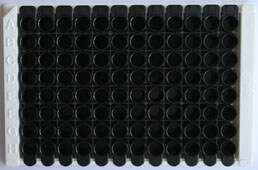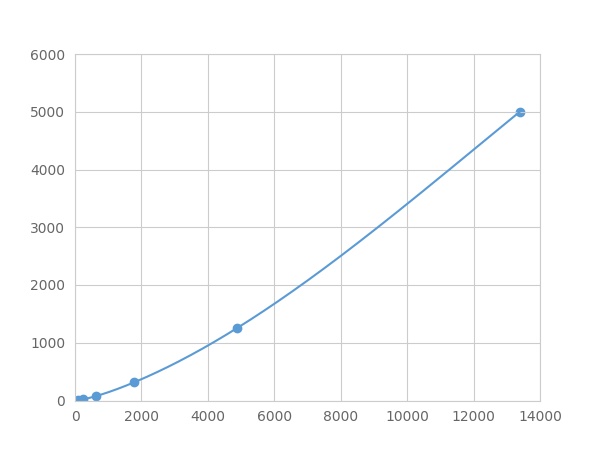Packages (Simulation)

Reagent Preparation

Image (I)
Image (II)
Certificate


Multiplex Assay Kit for Gelsolin (GSN) ,etc. by FLIA (Flow Luminescence Immunoassay)
GS; AGEL; ADF; Brevin; Gelsolin Amyloidosis,Finnish Type; Actin-depolymerizing factor
(Note: Up to 8-plex in one testing reaction)
- Product No.LMA372Mu
- Organism SpeciesMus musculus (Mouse) Same name, Different species.
- Sample TypeSerum, plasma and other biological fluids
- Test MethodDouble-antibody Sandwich
- Assay Length3.5h
- Detection Range4.88-5000pg/mL
- SensitivityThe minimum detectable dose of this kit is typically less than 1.627 pg/mL.
- DownloadInstruction Manual
- UOM 8Plex 7Plex 6Plex 5Plex 4Plex 3Plex 2Plex1Plex
- FOB
US$ 405
US$ 420
US$ 443
US$ 475
US$ 506
US$ 552
US$ 622
US$ 778
Add to Price Calculator
Result
For more details, please contact local distributors!
Specificity
This assay has high sensitivity and excellent specificity for detection of Gelsolin (GSN) ,etc. by FLIA (Flow Luminescence Immunoassay).
No significant cross-reactivity or interference between Gelsolin (GSN) ,etc. by FLIA (Flow Luminescence Immunoassay) and analogues was observed.
Recovery
Matrices listed below were spiked with certain level of recombinant Gelsolin (GSN) ,etc. by FLIA (Flow Luminescence Immunoassay) and the recovery rates were calculated by comparing the measured value to the expected amount of Gelsolin (GSN) ,etc. by FLIA (Flow Luminescence Immunoassay) in samples.
| Matrix | Recovery range (%) | Average(%) |
| serum(n=5) | 79-102 | 78 |
| EDTA plasma(n=5) | 94-103 | 97 |
| heparin plasma(n=5) | 95-105 | 99 |
Precision
Intra-assay Precision (Precision within an assay): 3 samples with low, middle and high level Gelsolin (GSN) ,etc. by FLIA (Flow Luminescence Immunoassay) were tested 20 times on one plate, respectively.
Inter-assay Precision (Precision between assays): 3 samples with low, middle and high level Gelsolin (GSN) ,etc. by FLIA (Flow Luminescence Immunoassay) were tested on 3 different plates, 8 replicates in each plate.
CV(%) = SD/meanX100
Intra-Assay: CV<10%
Inter-Assay: CV<12%
Linearity
The linearity of the kit was assayed by testing samples spiked with appropriate concentration of Gelsolin (GSN) ,etc. by FLIA (Flow Luminescence Immunoassay) and their serial dilutions. The results were demonstrated by the percentage of calculated concentration to the expected.
| Sample | 1:2 | 1:4 | 1:8 | 1:16 |
| serum(n=5) | 80-91% | 81-88% | 87-102% | 92-101% |
| EDTA plasma(n=5) | 94-105% | 97-104% | 83-95% | 95-103% |
| heparin plasma(n=5) | 80-91% | 88-102% | 86-101% | 92-105% |
Stability
The stability of kit is determined by the loss rate of activity. The loss rate of this kit is less than 5% within the expiration date under appropriate storage condition.
To minimize extra influence on the performance, operation procedures and lab conditions, especially room temperature, air humidity, incubator temperature should be strictly controlled. It is also strongly suggested that the whole assay is performed by the same operator from the beginning to the end.
Reagents and materials provided
| Reagents | Quantity | Reagents | Quantity |
| 96-well plate | 1 | Plate sealer for 96 wells | 4 |
| Pre-Mixed Standard | 2 | Standard Diluent | 1×20mL |
| Pre-Mixed Magnetic beads (22#:GSN) | 1 | Analysis buffer | 1×20mL |
| Pre-Mixed Detection Reagent A | 1×120μL | Assay Diluent A | 1×12mL |
| Detection Reagent B (PE-SA) | 1×120μL | Assay Diluent B | 1×12mL |
| Sheath Fluid | 1×10mL | Wash Buffer (30 × concentrate) | 1×20mL |
| Instruction manual | 1 |
Assay procedure summary
1. Preparation of standards, reagents and samples before the experiment;
2. Add 100μL standard or sample to each well,
add 10μL magnetic beads, and incubate 90min at 37°C on shaker;
3. Remove liquid on magnetic frame, add 100μL prepared Detection Reagent A. Incubate 60min at 37°C on shaker;
4. Wash plate on magnetic frame for three times;
5. Add 100μL prepared Detection Reagent B, and incubate 30 min at 37°C on shaker;
6. Wash plate on magnetic frame for three times;
7. Add 100μL sheath solution, swirl for 2 minutes, read on the machine.
GIVEAWAYS
INCREMENT SERVICES
| Magazine | Citations |
| Neurochmical Research | Gelsolin in Cerebrospinal Fluid as a Potential Biomarker of Epilepsy SpringerLink: 3585r8h46q7r0171 |
| Journal of Neuroinflammation | Treatment with gelsolin reduces brain inflammation and apoptotic signaling in mice following thermal injury BioMed: 17422094 |
| Biomedical Engineering and Informatics | Application of iTRAQ quantitative proteomics in identification of serum biomarkers in breast cancer IEEE: 6098563 |
| European Journal of Obstetrics & Gynecology and Reproductive Biology | Investigation of the actin scavenging system in pre-eclampsia Pubmed: 24239294 |
| The Annals of Thoracic Surgery | Proteomic Study Reveals Plasma Protein Changes in Congenital Heart Diseases Pubmed: 24565402 |
| BMC Anesthesiol.? | The role of plasma gelsolin in cardiopulmonary bypass induced acute lung injury in infants and young children: a pilot study Pubmed:Pmc4132929 |
| Cell Biochemistry and Biophysics | Gelsolin: Role of a Functional Protein in Mitigating Radiation Injury Pubmed:25164111 |
| Neurosci Lett | Plasma gelsolin and matrix metalloproteinase 3 as potential biomarkers for Alzheimer disease PubMed: 25864780 |
| Proteomics Clinical Applications | Comparative mass spectrometric and immunoassay‐based proteome analysis in serum of Duchenne muscular dystrophy patients Pubmed:26680509 |
| PROTEOMICS - Clinical Applications | Comparative mass spectrometric and immunoassay-based proteome analysis in serum ofDuchenne muscular dystrophy patients. pubmed:26680509 |
| Medicina Intensiva | Serum gelsolin levels in aneurismal subarachnoid hemorrhage: Preliminary results. pubmed:28365030 |
| Journal of Alzheimers Disease | Urine-Based Biomarkers for Alzheimer's Disease Identified Through Coupling Computational and Experimental Methods Pubmed:30040720 |
| World Journal of Pediatrics | Plasma gelsolin level predicts acute kidney injury after cardiopulmonary bypass in infants and young children Pubmed:29427164 |
| Biomedicines | Production and Secretion of Gelsolin by Both Human Macrophage-and Fibroblast-like Synoviocytes and GSN Modulation in the Synovial Fluid of Patients with Various … Pubmed:35327525 |
| Catalog No. | Related products for research use of Mus musculus (Mouse) Organism species | Applications (RESEARCH USE ONLY!) |
| RPA372Mu01 | Recombinant Gelsolin (GSN) | Positive Control; Immunogen; SDS-PAGE; WB. |
| RPA372Mu02 | Recombinant Gelsolin (GSN) | Positive Control; Immunogen; SDS-PAGE; WB. |
| PAA372Mu02 | Polyclonal Antibody to Gelsolin (GSN) | WB; IHC; ICC; IP. |
| PAA372Mu01 | Polyclonal Antibody to Gelsolin (GSN) | WB; IHC; ICC; IP. |
| SEA372Mu | ELISA Kit for Gelsolin (GSN) | Enzyme-linked immunosorbent assay for Antigen Detection. |
| LMA372Mu | Multiplex Assay Kit for Gelsolin (GSN) ,etc. by FLIA (Flow Luminescence Immunoassay) | FLIA Kit for Antigen Detection. |





